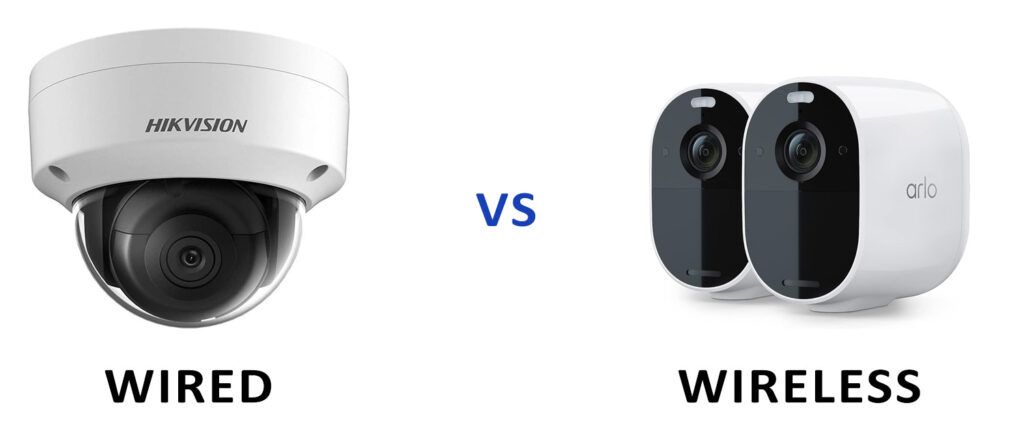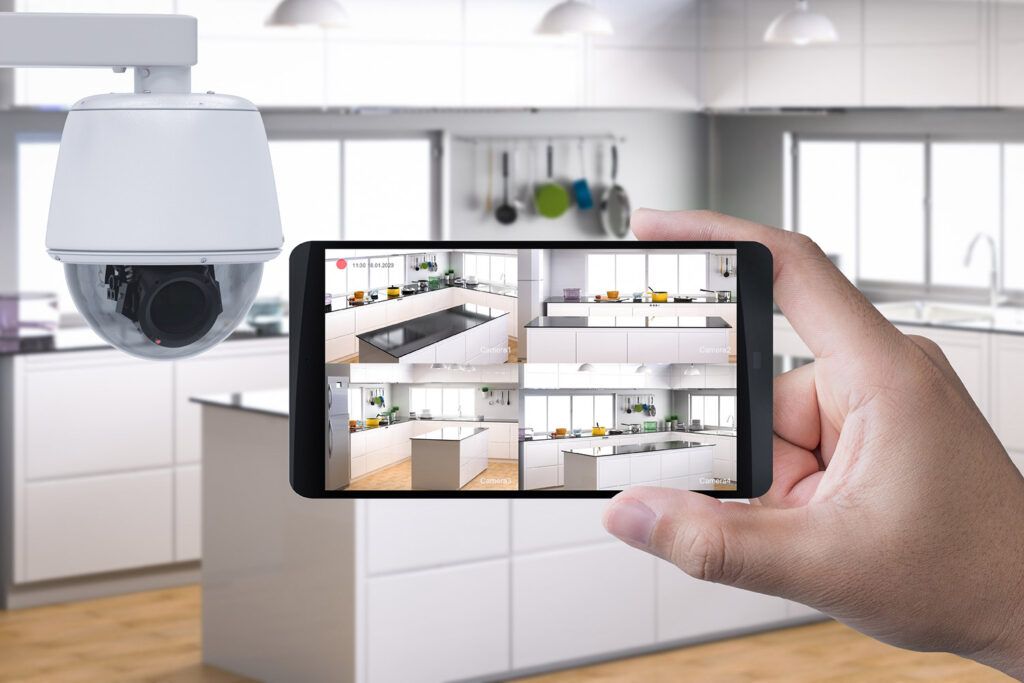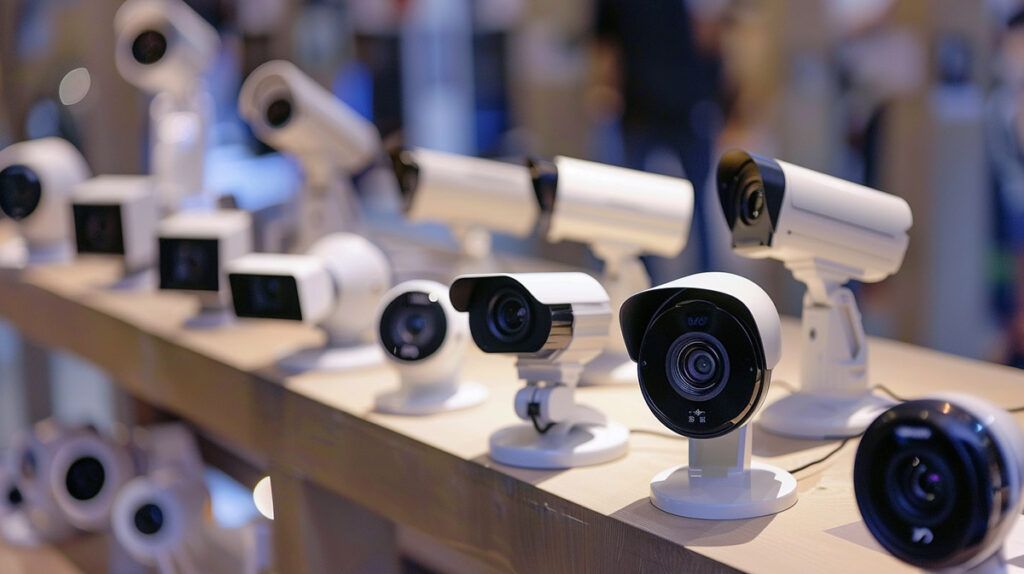Wired vs Wireless Security Cameras: Which Is Best?

Security cameras are one of the most important components of a home security system. While some are pricier than others, there are numerous options available from various brands, allowing you to pick and choose the features you want while protecting your home and family.
But when it comes to wired vs wireless security cameras, which one is best for most homeowners? It depends on your goals for your home security camera system. Each type of camera has advantages and disadvantages regarding its setup, reliability, and pricing that are important to understand before buying one.
Wired vs Wireless - Why It Matters

Shown: Hikvision wired camera and Arlo wireless camera
Choosing the right security tools for your home is essential for keeping your family safe and your valuables protected. If you have a security system that’s difficult to use or unreliable, it won’t do you much good in terms of being or feeling safer.
One of the most important decisions to make when building your security system is whether to buy wired or wireless security cameras. You can use either type inside or outside of your home, like in entryways or on your porch. Modern doorbell camera options also offer the choice of wired or wireless connections.
Although there’s no wrong choice when deciding between wired vs wireless security cameras, there might be a more suitable pick for your home, depending on factors like your budget, how easy you want your system’s setup to be, and whether you want your cameras to continuously record footage or only show a live view when prompted.
To help you decide between a wired vs wireless camera, we’ve compiled this helpful guide breaking down the pros and cons of each and reasons you might want to choose one over the other.
👉 Related: What To Do If Your House Cleaner Is Stealing
Wired Security Cameras
Overview - What Are Wired Security Cameras?
A wired security camera connects to a power source and the home’s internet network via an ethernet cable. Once connected, a homeowner won’t need to monitor battery life or reconnect their camera to the internet.
A wired camera is typically used for round-the-clock monitoring, as it has a continuous power source and internet connection for reliable, 24/7 recording. When a wired camera records audio and video signals, it sends those recordings to a main hub connected to a home’s security or monitoring system for storage or viewing. Many modern wired systems also include a home security app, allowing a homeowner to view live video or recordings from their mobile device.
Pros and Cons of Wired Cameras
👍
Pros
- Continuous power without needing to charge or replace batteries
- Continuous, stable network connection
- High audio and video quality capabilities
- Signal from other devices won’t interfere
👎
Cons
- Can be complicated to set up and install
- Can’t be moved easily
- May not be feasible in a rental
Wired security cameras have multiple benefits for homeowners, like having a consistent connection to the internet and a power source, but there are also a few drawbacks to think about if you’re considering buying them — most notably, that they can be difficult to install if you’re not experienced with wiring and technical setups.
When To Use Wired Security Cameras
Homeowners looking for the most reliable type of security camera usually opt for a wired camera. Wired security cameras connect to your home’s wiring to deliver continuous power and internet connectivity to the camera. Usually, this happens through an ethernet connection, also known as Power Over Ethernet, or PoE. Ethernet cables use a low-voltage current to deliver consistent power to the camera, so you won’t need to worry about a battery dying or needing to go without security temporarily while you charge your camera.
Considering this, wired security cameras are best used when you want continuous monitoring of your home. For example, cameras set to record video outside your home at all times for around-the-clock surveillance should be wired cameras.
Wired cameras are also best for recording high-quality audio and video. Many wired systems have higher audio and video quality capabilities than wireless cameras because of their continuous connection without the worry of draining battery life to record in high resolution. If you want the clearest shots for surveillance purposes, a wired camera is usually the best choice.
Wired cameras can also be a good option if you want a permanent security solution for your home. They aren’t easily moveable from one place to another without removing and redoing their connection wiring, so it’s best to leave them in place once installed. As a bonus, wired cameras can be more difficult for someone to steal, so they work especially well for outdoor security, where cameras tend to be more vulnerable to theft.
When NOT To Use Wired Security Cameras
If you rent your home or plan to move soon, a wired security camera may not be the best choice. The wires for wired systems usually run through walls rather than around walls for aesthetic and safety purposes — a task that some landlords may not approve of. If your landlord gives you the okay to run a wired camera system in your rental, consider getting their approval in writing that includes any specific exceptions they might have, like not drilling through a particular wall or making multiple holes in walls to place your cameras.
You also might want to stay away from wired security cameras if you need a budget-friendly system. Although wired cameras are usually more affordable than wireless cameras, their setup costs are often higher unless you make it a DIY project. If you need to hire someone to set up your cameras, you’ll need to add those professional costs to your budget.
Finally, if you’re not looking for the most prestigious audio and video quality and don’t need cameras that continuously record, you may find that a wired security camera has more than you need. You could save yourself some money and setup time by choosing a wireless security camera, which works well for pop-ins and casual monitoring.
Wireless Security Cameras

Overview - What are Wireless Security Cameras?
A wireless security camera, also referred to as a WiFi security camera, does not require a connection via your home’s wiring to run. Instead, these cameras usually operate using a battery, with many modern options including a rechargeable battery or the ability to charge using solar power.
While a wireless camera doesn’t require a consistent power source from the home to run, it does need a constant connection to a WiFi network. Once connected, users can view the camera live or record footage. However, because these cameras run over WiFi, it may take several seconds to connect to the camera compared to the more instant view wired cameras provide.
Pros and Cons of Wireless Cameras
👍
Pros
- Generally easy to set up
- Portable and easy to move to a new location
- Budget-friendly
- Can still work during a power outage
👎
Cons
- No consistent power source; usually runs on rechargeable battery
- Can have interrupted network connection
- Can have network security vulnerabilities
- Limited audio and video quality
Many renters gravitate toward wireless cameras because they don’t require wiring and are easily moved from one area of a home to another. However, wireless cameras are also known for being generally more unreliable in terms of audio and video quality and connection. Here are the top pros and cons of wireless cameras to consider.
👉 Related Reading: 5 Best WiFi Extenders for Security Cameras in 2025
When To Use Wireless Security Cameras
Wireless security cameras tend to get a negative reputation for their need for replacement batteries since they don’t connect to your home’s power source. However, many modern cameras have rechargeable batteries that last several months before needing a charge or solar power capabilities. If you live in an area that gets lots of sunlight, you can use a wireless security camera that connects to a solar power adaptor for reliable power.
If your area is prone to power outages, you can also benefit from a wireless security camera. While wired cameras lose power if the home loses power, your wireless camera can still work, as long as it is charged.
Also, consider a wireless camera if you rent your home and aren’t allowed to modify the home’s wiring by adding wired cameras or if you plan to move soon. You can move wireless cameras easily from one location to another — you may just need to remove and replace a couple of screws, depending on how you mount it.
Wireless cameras also stand out for their simple setup, which doesn’t require you to have technical skills to get them running. Modern wireless cameras usually connect to a mobile app, which guides you through the process of connecting them to your WiFi network within a few seconds. If you’re worried about the complexity of setting up a camera system, wireless cameras are the most straightforward way to go.
When NOT To Use Wireless Security Cameras
Wireless cameras work best when connected to strong WiFi networks. Therefore, slow internet speeds or shoddy connections aren’t optimal for these cameras. People in rural areas without access to high-speed, reliable internet connections often can’t access the full benefits of wireless cameras.
On a similar note, if you’ve had issues with security vulnerabilities in your network, a wireless camera could be subject to the same vulnerabilities. Wireless cameras have been known to be vulnerable to unauthorized access and hacking, which can be a major safety concern. If you do have wireless cameras, be sure to use strong passwords for your device connections and network, and keep all firmware updated to reduce the risk of security vulnerabilities.
Another reason to potentially choose wired cameras over wireless is if you need high-level audio and video quality. Perhaps you live in an area without good lighting at night, making visibility challenging for cameras. Generally speaking, wireless cameras don’t have the same audio and video capabilities as wired security cameras, which can affect what you’re able to see and record during times of low visibility.
Wired vs Wireless Security Cameras: Which One Is Right for You?

Several factors go into finding the best home security system to keep your home safe and choosing the best home security cameras for the job is an important step in that process. With the right cameras, you can feel confident knowing you can check on your home and record video footage when needed to review later.
Wired cameras are best for homeowners looking for a permanent security solution for their homes. If you have experience setting up cameras or don’t mind paying someone to install them for you, wired security cameras are a good option. Just be aware that you may need to run extra wiring or drill some holes to place several cameras for an extensive security system.
On the other hand, wireless security cameras are usually the better option for renters or anyone who needs a more temporary security solution. Their simple setup makes it easy for virtually anyone to power on their camera and start viewing live video. Plus, modern cameras have started to offer more reliable, lengthier power sources than older camera versions to boost their reliability and convenience.